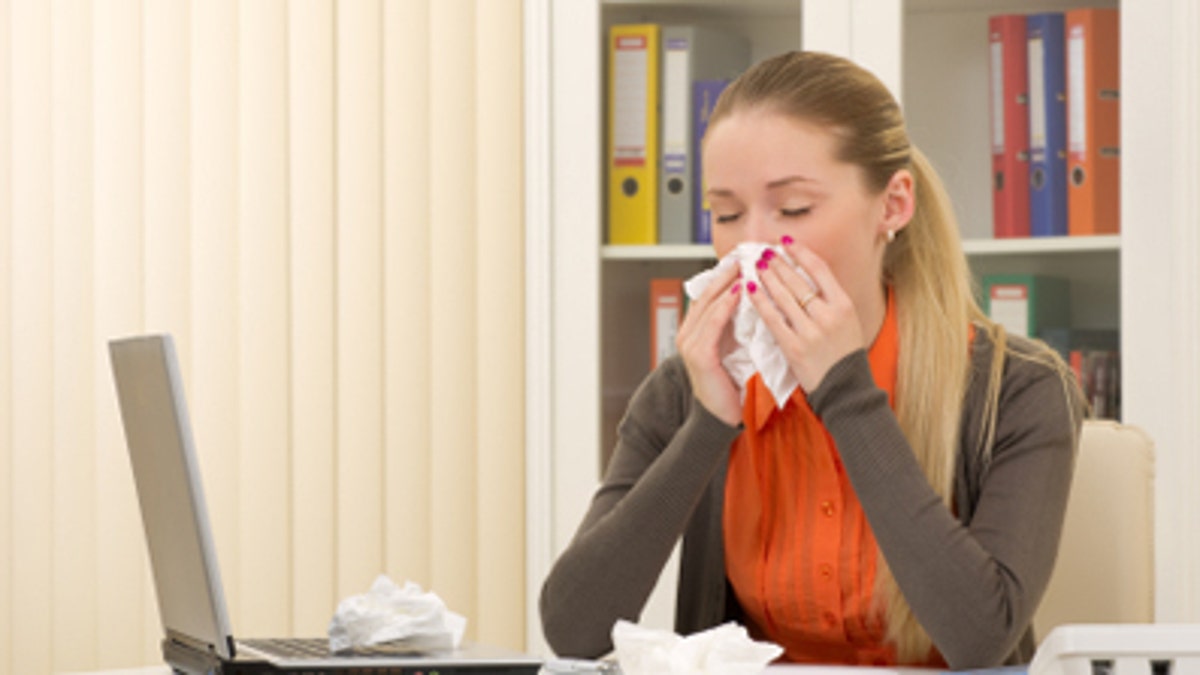
During cold and flu season, staying germ-free at work often means dodging a minefield of sneezes and coughs. Few people keep their germs to themselves when they’re sick.
More than 60 percent of employees said they felt compelled to go into work when they were sick because there was “too much going on” or felt the need to “tough it out,” according to a Staples Advantage’s 2011 survey. Another survey by BLR, a human resource consulting company, found that 30 percent of workers admit to sometimes going into the office even when they know they're contagious.
If you’re the boss or supervisor, you can urge an employee who seems feverish or is hacking up a storm to go home, but there’s little you can do to get a contagious co-worker out of the office. Your survival this winter comes down to protecting yourself from the virus lurking at work. Here are your best strategies to stay healthy at work, and what you can do when you’re sick to protect your office mates.
Staying Germ-Free
• Get this year’s flu shot. That’s the single most important thing you can do to prevent getting the flu. It’s not too late either. “Flu season typically peaks in January or February and can last as late as May,” says Dr. Anne Schuchat, director of CDC’s National Center for Immunization and Respiratory Diseases. Do it next week, during National Influenza Vaccination Week.
• Keep your distance. Cold and flu viruses are spread mainly through the air from coughing, sneezing and talking, so keep your distance—five or six feet—from co-workers during sick season, says Dr. Belinda Ostrowsky, an infectious disease specialist at Montefiore Medical Center in Bronx, N.Y. Adults with the flu may be contagious a day before they develop symptoms so you never know who’s contagious. You’re also contagious five to seven days after becoming sick, but most people don’t stay out of the office that long.
• Wash your hands—a lot! Your hands can also pick up cold viruses (which include sore throats) from touching surfaces that are infected. Some cold viruses can survive for up to three hours on objects like door knobs, desks, printers, the office coffee pot, elevator buttons, and stairway handrails. So wash your hands often, and especially before eating. Avoid touching your eyes, nose or mouth.
• Limit handshaking. Do a fist bump instead or carry a coffee cup around so you can’t shake hands.
• Take vitamin C or vitamin D. Studies are mixed, but some show that these vitamins can boost your immune system to prevent colds and reduce their severity.
• Take zinc. If you feel like you’re coming down with something, you can try zinc lozenges. Others swear by Echinacea, but the research is mixed. Both are thought to reduce the length and severity of your symptoms.
• Get enough sleep. Your immunity goes down when you’re sleep deprived.
Keeping Others Germ-Free
• Stay home if you have a fever. The rule of thumb is to wait 24 hours after the fever subsides before going back to work, Ostrowsky says. Be especially cautious about returning to work if you work with a vulnerable population like the elderly or young children.
• Cover your mouth and nose with a tissue when you cough or sneeze. Toss it immediately. Otherwise, cough into your upper sleeve or the crook of your elbow, not your hands.
• Wash your hands after blowing your nose and coughing into it. Keep a bottle of hand sanitizer at your desk, because you’re unlikely to jump up to go wash your hands every time you sneeze.
• Keep your distance from people, so they don’t have to keep it from you. Refrain from shaking hands.
